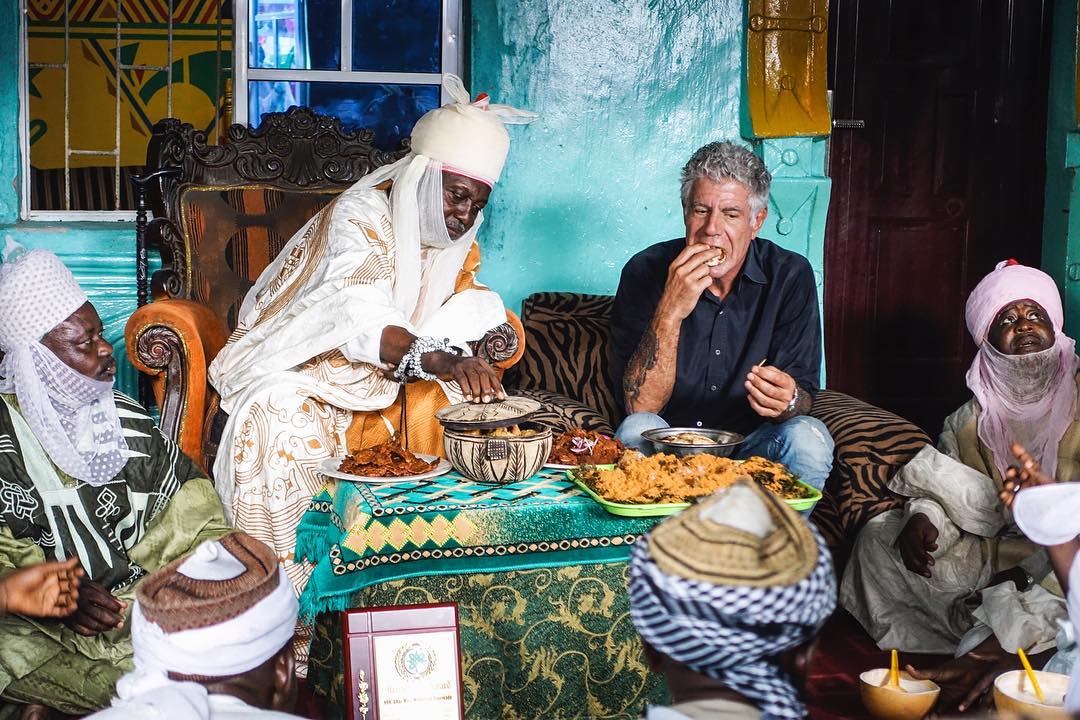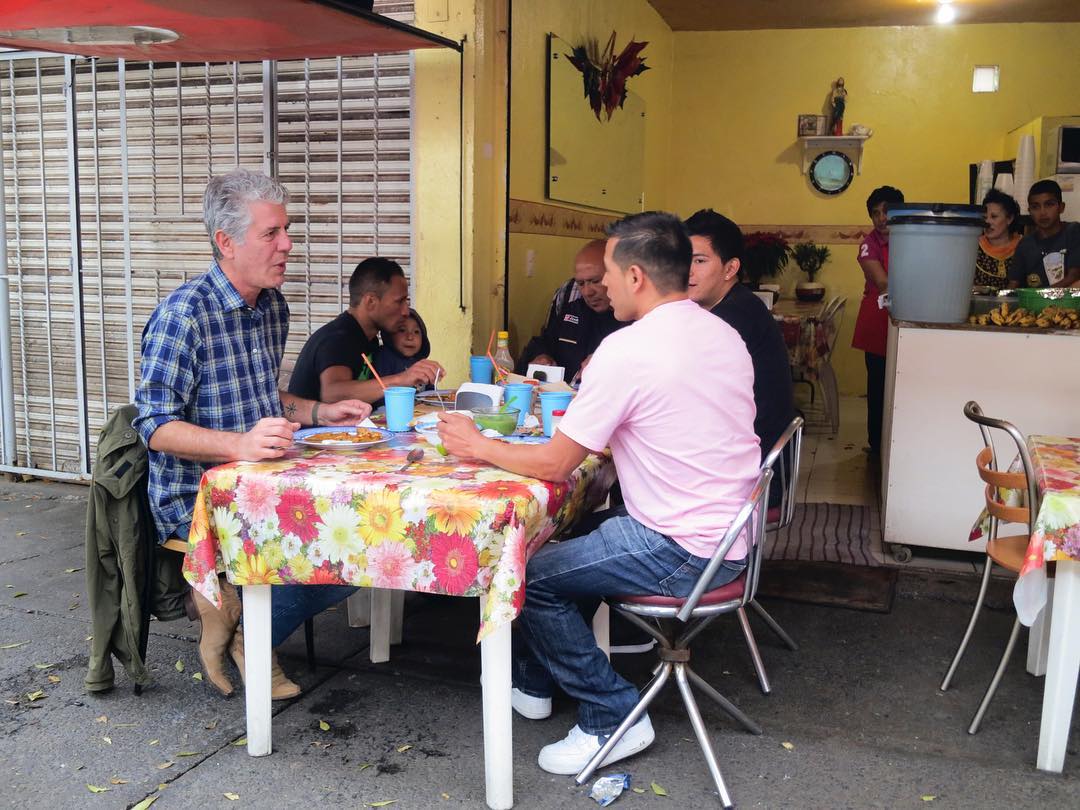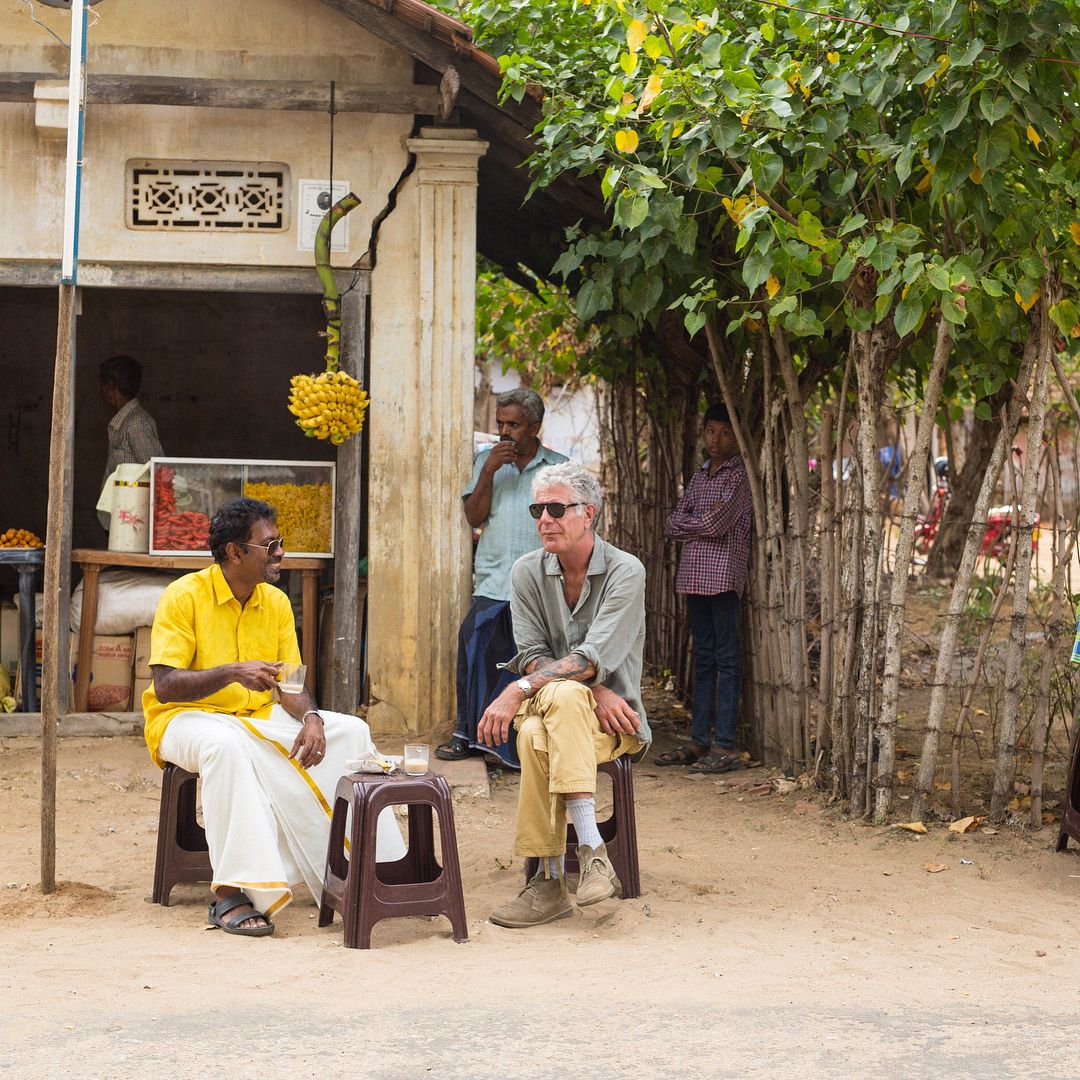Remembering the Wondrous Life of Anthony Bourdain

Lagos, Nigeria, 2017. Parts Unknown/Instagram
When news spread in June 2018 that Anthony Bourdain died by suicide at 61, the shock, rippling across social media, felt seismic. Three years later, it seems that many people, like me, are still feeling the aftershocks.
My sister showed me an early episode of No Reservations a million years ago. I remember she introduced him as a travelling, irreverent chef with a caustic sense of humour who, she claimed, was my cup of tea. As with most things, she nailed it. My connection to Bourdain's work was instant. Back then, I had already lived in two countries and knew living overseas would be a frequent occurrence in my life.
I've spent the past decade living in various places, like Sweden, South Sudan, and Colombia. This way of experiencing the world, not just briefly seeing it, for the fortunate few of us who willingly and regularly choose to change geographies, is a profound privilege and an invaluable gift. Bourdain was acutely aware of this.
He had a snarl, a tongue sharper than knives, and closets full of demons he was often fairly open about. But he treated the world as if he had not given up on it. This is why I still mourn his absence.

Mexico City, 2018. Jeff Allen/Parts Unknown/Instagram
Bourdain didn't portray travelling as a magical and pleasurable activity. He wasn't a cultural voyeur, a fetishizer, or white saviour who narrowly depicted the places he travelled to as exotic or foreign.
Whether he was in the Bronx, Puebla, Lagos, or Hanoi, he connected from a place of genuine curiosity and solidarity. He didn’t condescend; instead, he used his platform to share the stories of people who are so often left out of the spotlight – or who when they do get media coverage, end up being othered.
Bourdain’s episodes on Colombia captured that country’s renewal. His episode on Nicaragua was respectful of the people and a kick in the face to the Ortega govt. He got both countries correct.
— boz (@bloggingsbyboz) June 8, 2018
He candidly noted that getting out of your comfort zone involves a lot of discomfort and exhilaration and, above all, great humility.
As you move through this life and this world you change things slightly, you leave marks behind, however small. And in return, life - and travel - leaves marks on you. Most of the time, those marks - on your body or on your heart - are beautiful. Often, though, they hurt.
― The Nasty Bits: Collected Varietal Cuts, Usable Trim, Scraps, and Bones by Anthony Bourdain
Bourdain's genius wasn't in the kitchen. It was in the depth and nuance of his chronicles of societies, cultures, peoples, and histories.
Food was his tool to contextualize and humanize realities.
He called out injustice and the miscreants of the world who show no empathy to human beings. After visiting Cambodia, Bourdain wrote of Henry Kissinger, "that treacherous, prevaricating, murderous scumbag," that "you'll never stop wanting to beat [him] to death with your bare hands."
In accepting an award for the Jerusalem episode of CNN's Parts Unknown, he didn't mince words.
"There is a measure I guess of how twisted and shallow our depiction of a people is that these images come as a shock to so many. The world has visited many terrible things on the Palestinian people, none more shameful than robbing them of their basic humanity. People are not statistics. That is all we attempted to show."
Perhaps declarations like these aren't anything revelatory to some people. However, Bourdain's platform was in the mainstream and with an audience by the millions. How many famous people of equal or further standing have you heard calling out injustices so openly without backing down, regardless of the consequences?
The trait I admired the most about Bourdain (also a personal aspiration) was his capacity for reinvention. He turned his life around in his early 40s. He moved from chef and drug addict to recovery, best-selling author, blue belt in Brazilian jiu-jitsu, and television raconteur extraordinaire, proving it's never late for a second or third act.
The blood boils when one thinks about how those seemingly best suited to live long and thrive in this world are the bloodsuckers who treat human misery and division as arbitrage opportunities.

Sri Lanka, 2017. David Scott Holloway/Parts Unknown/Instagram
We were incredibly fortunate to have Anthony Bourdain taking us along with him for as long as he did. Three years have gone by, and I still think, damn — what a loss. What a colossal loss.
But his work doesn't end with him.
Bourdain left us with a rich legacy of connection and solidarity across differences. He called out the powerful for their hypocrisy and callousness.
He was man who was always, in his words, hungry for more. But food simply was his entry point to larger discussions.
This is a goal I've taken for my own work — to write about and communicate social and global issues, not for their own sake but to understand the forces that shape them.
His relentless curiosity and avid enthusiasm for tacos, pho, and The Stooges, will stay with me forever.
¡Viva Anthony Bourdain!
💡 If you or someone you know is struggling, please seek help. In Canada, call the Canada Suicide Prevention Service at 1-833-456-4566. The International Association for Suicide Prevention and Befrienders Worldwide also can provide contact information for crisis centers around the world.
👀 Did I miss anything? Make a mistake? Let me know. Share with me your thoughts, suggestions, or critiques. Follow me on Twitter: @e_sarin. Or email me at: elenasosalerin@gmail.com.